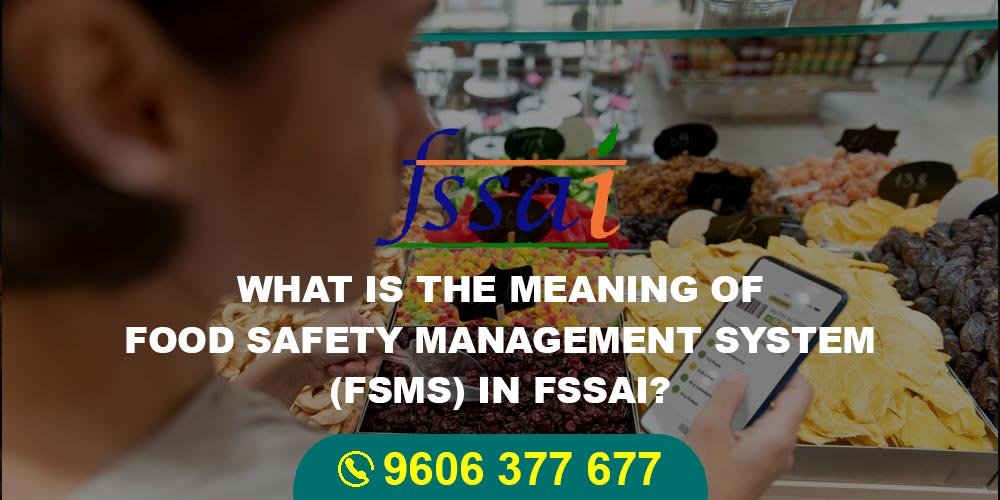What is the Meaning of Food Safety Management System (FSMS) in FSSAI?: The Food Safety Management System plan is a fixed of requirements which have been installed to alter and oversee numerous elements of meals safety. Numerous worldwide food safety manipulates systems exist, collectively with ISO 22000, HACCP, and FSSC 22000. However, it is important to note that these certifications are all voluntary. In India, it is mandatory for Food Business Operators (FBOs) to develop and implement an FSMS plan. This requirement is applicable when applying for a new FSSAI licence or when renewing an existing one.
According to the Food Safety and Standards Act of 2006, a food safety manipulate device is defined due to the fact the adoption of precise hygienic practices, chance evaluation and crucial manipulate points, precise production practices, and every other practice that can be particular through regulation.
Requirement of FSMS plan in accordance with FSSAI.
The FSSAI (Food Safety and Standards Authority of India) has mandated that all food businesses in India must have a Food Safety Management System (FSMS) plan. This plan is crucial for ensuring the safety and quality of food products. It outlines the necessary procedures, controls, and practices that food businesses need to implement in order to comply with food safety regulations. The FSMS plan serves as a comprehensive framework for identifying and managing potential hazards, maintaining proper hygiene practices, and safeguarding the integrity of the food supply chain. By adhering to the FSMS plan, food businesses can demonstrate their dedication to food safety and protect the health and well-being of consumers. Regardless of their size or type, all food businesses are required to prepare an FSMS plan, even if they already have a food safety certification from ISO or HACCP. However, for the ones groups with ISO, HACCP, or FSSC certification, making ready an FSMS plan can be less complicated as there are regions of overlap.
FSSAI Registration
The oversight and control of all food businesses in India lie with the Food Safety and Standards Authority of India. Its principal role is to supervise and regulate Food Business Operators, ensuring that they comply with the required quality standards during the manufacturing or selling of food products and thereby prevent the production and sale of adulterated or substandard foodstuffs.
The rules that govern FBOs are laid out in the Food Safety and Standards Act of 2006. Any FBO engaged in corporation sports activities sports sports activities in India need to reap FSSAI registration or license in case you need to characteristic legally. As everyday with the FSSAI Regulation of 2011, FBOs engaged in manufacturing, storage, transportation or distribution of food products are obligated to obtain an FSSAI registration or license.
The process of obtaining FSSAI registration for FBOs is made easy through the online platform. By completing and submitting either Form A or Form B on the FoSCoS portal, FBOs can efficiently register. Additionally, they can also choose to register offline by submitting the required forms to the Food and Safety Department.
Various Categories of FSSAI Registration.
Depending on the size of the food business, the FSSAI offers various types of registration. Here are the different types of FSSAI registrations available.
- Basic FSSAI Registration
- State FSSAI License
- Central FSSAI License
Basic FSSAI Registration
Startups and small businesses can obtain Basic FSSAI permits. These permits are available for enterprises with an annual turnover of less than Rs. 12 lakhs. For your tiny enterprise to operate, all you need is a Basic Food license.
If your business generates revenue below Rs. 12 lakhs, you fall under the small business category. To obtain a Basic FSSAI registration/FSSAI certificate, you must fill out Form A. However, as quickly as your business’s annual income exceeds Rs. 12 lakhs, it becomes necessary to upgrade your food license from Basic FSSAI registration to state FSSAI registration.
To successfully complete the registration process, you will be required to submit the following documents:
- Proof of address
- Photos in passport size
- Details of the business
- Form for FSSAI declaration
State FSSAI License
Businesses falling within the revenue range of Rs. 12 lakhs to Rs.20 crores are obligated to steady a state-issued FSSAI license or certificate.
Businesses falling under this revenue threshold are eligible for a food license from the state. To apply for this license, applicants must complete Form B.
Kindly take note that you would need to provide the following documents to complete the application process:
- Proof of business premises which could be a rental/lease agreement.
- Valid identification proof of the business owner such as Aadhar, Voter ID, Driving License or Passport.
- Incorporation Certificate or GST Registration or Trading License.
- Memorandum of Association & Articles of Association.
- You would also need to provide one of the following licenses – trade license, establishment registration, panchayath license, corporation license or municipality license.
- Business details.
- FSSAI declaration forms.
Central FSSAI License
In order to operate a nationwide chain of business, it is mandatory to have a Central FSSAI food license. Small companies that generate annual earnings of extra than Rs. 20 Crores must also fall under this category. Therefore, if your mid-cap business generates more than Rs. 20 crores in annual revenue, you must apply for a Central food license and fill out Form B.
The submission of the following documents is mandatory:
- Documents pertaining to the business premises, such as the rental or lease agreement.
- Identification proof of the business owner, which can be Aadhar card, voter ID, driving license, or passport.
- Incorporation certificate, GST registration, or trade license.
- Import and export code.
- Memorandum of Association & Articles of Association.
- Any one of the following licenses: trade license, establishment registration, Panchayath license, corporation license, or municipality license.
- 7.List of partners, if applicable.
- Detailed information about the business.
- FSSAI declaration forms.

